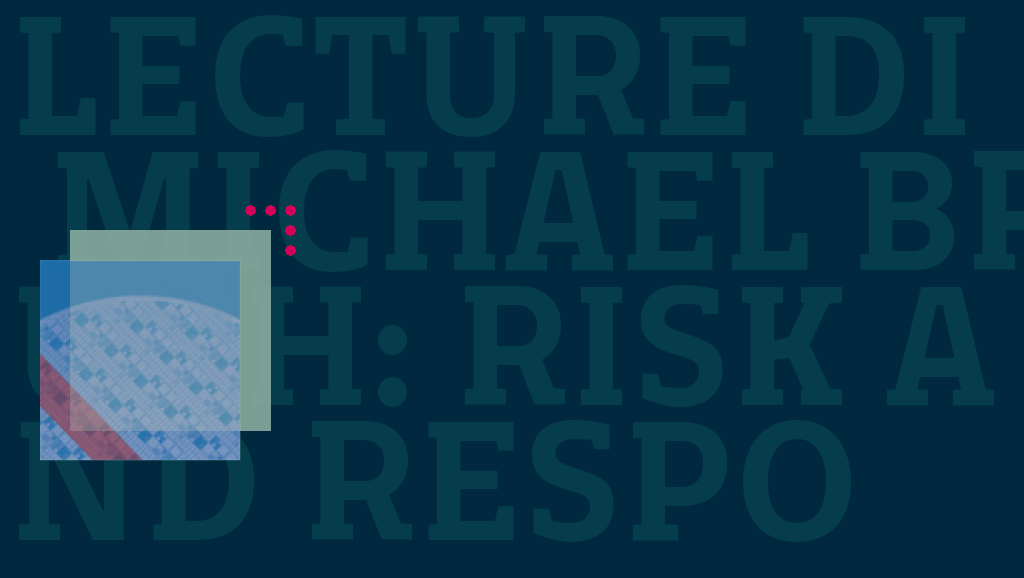L’innovazione guidata dalla tecnoscienza ha portato alla ribalta il concetto di rischio. Oggi chi vi è immerso è spinto a riflettere sulle conseguenze: dalle imprese assicuratrici, che assumono rischi per missione e si chiedono se all’approccio tradizionale – serie storiche e modelli probabilistici – non debba affiancarsene uno “di prospettiva”; alle istituzioni del sapere e dell’agire, impegnate ad aggiornare la categoria di responsabilità per fronteggiare l’impatto del rischio sulla società. Se ne discuterà partendo dalla lecture di Michael Bruch.
Fondazione Giannino Bassetti, Allianz SpA e Università Bocconi co-promuovono il convegno “Risk and Responsibility in Innovation”, che si svolgerà (con servizio di interpretariato), a Milano in Università Bocconi, Aula N03, Piazza Sraffa 11 il 27 novembre 2012 a partire dalle ore 9:30.
Dopo il benevenuto del rettore dell’Università Bocconi Andrea Sironi, Michael Bruch, responsabile Research & Development and Risk Consulting di AGCS-Allianz Global Corporate and Specialty terrà una lecture sul ruolo dell’assicurazione nelle tecnologie innovative, esaminando in particolare il caso delle nanotecnologie. Alla successiva discussione parteciperanno: Alfonso Gambardella, docente dell’Università Bocconi, Jonathan Hankins della Fondazione Giannino Bassetti, Fabian Muniesa dell’Observatory for Responsible Innovation, Mines Paris Tech.
(vedi i profili dei partecipanti)

Michael Bruch, Head of Research & Development, Risk Consulting, Allianz Global Corporate & Specialty AG (AGCS), Germany
Michael Bruch, is an economist and environmental engineer and Head of the Research & Development department in Allianz Global Corporate & Specialty AG (AGCS), the Allianz Company dedicated to corporate and specialist insurance solutions. With his 15 years experience in environmental management for a global gas generating company and risk management consulting for Allianz Center for Technology he gained a broad knowledge of projects in the field of environmental and risk management. In his current position he is responsible for the NatCat risk assessment strategy of the worldwide engineers’ network of AGCS and for emerging scenarios and trends. Within this framework he identifies, monitors and assesses new scientific, legal and technical risk issues e.g. nanotechnology, power blackout risks and natural catastrophes. This is also the basis to develop new risk mitigation and service solutions with suitable risk assessment approaches.
Link:
Nanotechnology: No small matter
—
Alfonso Gambardella, Professor, Department of Management & Technology, Università Commerciale “Luigi Bocconi”, Milan, Italy
His research interest is on Economics of Technological Change, Applied Industrial Organization and Strategic Management.
He is interested in understanding how technology and innovation affect and are affected by company strategy, industry structure, and policy. Because technology and innovation are pervasive in economic activities, He ended up dealing with several topics and questions, ranging from micro and managerial issues to industry level and even more macro phenomena.
Link:
Personal site
—
Jonathan Hankins holds a degree in Sociology and Masters in Applied Social Research from Manchester University (UK) and has a healthy interest in ethics.
As well as writing for the Bassetti Foundation he is a frequent blogger and author on the community run Technology Bloggers website.
A lifelong musician who still makes records, produces and acts in plays and street theatre, he currently finds himself in Boston, USA.
Links:
Governance and participation in nanotechnology
Technology Bloggers
—
Fabian Muniesa is a researcher at the Center for the Sociology of Innovation, Mines ParisTech, and the director of the Observatory for Responsible Innovation, a Mines ParisTech think tank for the the advancement of democratic debate in innovation policy. His earlier research contributed to the development of the social studies of finance, a research area that considers financial markets from the angle of social practice and that emphasizes the role that technological devices and scientific knowledge have in the construction of financial order and disorder. This research program is illustrated by two influential edited volumes: Market Devices (Blackwell, 2007) and Do Economists Make Markets? (Princeton UP, 2007). His more recent contributions focus on the anthropology of business culture and the sociology of economic valuation.
Links:
Center for the Sociology of Innovation
Mines ParisTech
Observatory for Responsible Innovation
Market Devices
















